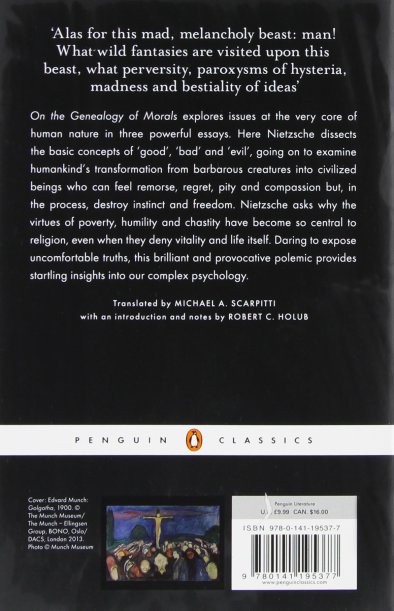Zur Genealogie der Moral
On the Genealogy of Morality: A Polemic (German: Zur Genealogie der Moral: Eine Streitschrift) is an 1887 book by German philosopher Friedrich Nietzsche. It consists of a preface and three interrelated essays that expand and follow through on concepts Nietzsche sketched out in Beyond Good and Evil (1886). The three Abhandlungen trace episodes in the evolution of moral concepts with a view to confronting “moral prejudices”, specifically those of Christianity and Judaism. (Wikipedia)
Text from this book:
VIII If this writing is incomprehensible to someone or other and hurts his ears, the blame for that, it strikes me, is not necessarily mine. The writing is sufficiently clear given the conditions I set out—that you have first read my earlier writings and have taken some trouble to do that, for, in fact, these works are not easily accessible. For example, so far as my Zarathustra is concerned, I don’t consider anyone knowledgeable about it who has not at some time or another been deeply wounded by and profoundly delighted with every word in it. For only then can he enjoy the privilege of sharing with reverence in the halcyon element out of which that work was born, in its sunny clarity, distance, breadth, and certainty.
In other cases the aphoristic form creates difficulties which stem from the fact that nowadays people don’t take this form seriously enough. An aphorism, properly stamped and poured, has not been “deciphered” simply by being read. It’s much more the case that only now can one begin to explicate it—and that requires an art of interpretation. In the third essay of this book I have set out a model of what I call an “interpretation” for such a case. In this essay an aphorism is presented, and the essay itself is a commentary on it. Of course, in order to practice this style of reading as an art, one thing is above all essential—something that today has been thoroughly forgotten (and so it will require still more time before my writings are “readable”)—something for which one almost needs to be a cow, at any rate not a modern man—rumination.
Synopsis
 Written at the height of the philosopher’s intellectual powers, Friedrich Nietzsche’s On the Genealogy of Morals has become one of the key texts of recent Western philosophy. Its essayistic style affords a unique opportunity to observe many of Nietzsche’s persisting concerns coming together in an illuminating constellation. A profound influence on psychoanalysis, antihistoricism, and poststructuralism and an abiding challenge to ethical theory, Nietzsche’s book addresses many of the major philosophical problems and possibilities of modernity.
Written at the height of the philosopher’s intellectual powers, Friedrich Nietzsche’s On the Genealogy of Morals has become one of the key texts of recent Western philosophy. Its essayistic style affords a unique opportunity to observe many of Nietzsche’s persisting concerns coming together in an illuminating constellation. A profound influence on psychoanalysis, antihistoricism, and poststructuralism and an abiding challenge to ethical theory, Nietzsche’s book addresses many of the major philosophical problems and possibilities of modernity.
—
On the Genealogy of Morals (1887) is a book about interpretation and the history of ethics which raises profoundly disquieting issues about the violence of both. This is the most sustained of Nietzsche’s later works and offers one of the fullest expressions of his characteristic concerns. The introduction places his ideas within the cultural context of his own time and stresses the relevance of his work for a contemporary audience.
—
 Friedrich Nietzsche claimed that the purpose of On the Genealogy of Morals was to call attention to his previous writings. But in fact the book does much more than that, elucidating and expanding on the cryptic aphorisms of Beyond Good and Evil, and presenting a coherent discussion of morality in a work that is more accessible than much of his previous writings.
Friedrich Nietzsche claimed that the purpose of On the Genealogy of Morals was to call attention to his previous writings. But in fact the book does much more than that, elucidating and expanding on the cryptic aphorisms of Beyond Good and Evil, and presenting a coherent discussion of morality in a work that is more accessible than much of his previous writings.
—
We are unknown, we knowers, ourselves to ourselves: this has its own good reason. We have never searched for ourselves—how should it then come to pass, that we should ever find ourselves? Rightly has it been said: “Where your treasure is, there will your heart be also.” Our treasure is there, where stand the hives of our knowledge. It is to those hives that we are always striving; as born creatures of flight, and as the honey-gatherers of the spirit, we care really in our hearts only for one thing—to bring something “home to the hive!”
Reading On the Genealogy of Morals
Reading it here at archive.org or download the PDF here On the Genealogy of morals
Podcast
The Radix Podcast Listening to the podcast on Genealogy of Morals click here

